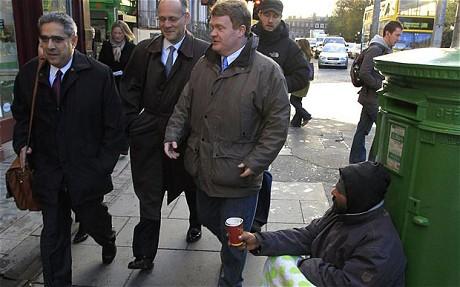The IMF sent their best twelve: Myths, Metaphors & Irish (Debt) Redemption

The metaphor is not yet sovereign.
In a strange twist of globalisation, I listened to RTE Radio 1, driving through Oxfordshire when the announcement about the IMF came. The digital radio cut in and out, pausing and catching itself as it slipped from the 3G Network. As we passed a large born-again Christian sign reading 'Jesus died on the cross to pay for our sins,' the radio cut back in to news that the IMF had sent twelve of their best men to discipline Ireland, to bring the good news. I want to suggest that the great danger of this metaphor - that Ireland may be redeemed - is that it becomes one of our political myths.
The IMF sent twelve of their best to bring the news of debt redemption, financial discipline and lemon socialism. I still cannot quite believe the fact of twelve disciples of neoliberalism, twelve financial technocrats sent to save us from our own sin. This holy dozen are, apparently, the very material proof of 'our' need for penance. 'We' as a nation were addicted to debt. 'We' lived so long on borrowed time. 'We' had our decadent (a-religious) years of the tiger. Now, our temporal credit-line has run out and it is time to suffer to make up for our years of Sodom and Gomorrah. A country of sinners, who must now pay. However, the metaphor of penance and sin is dangerous, because it is at this moment that it takes on a material aspect.
All myths involve a certain elision of the complexity of the situation. In fact, they require a subtle foregrounding of certain facts and a quiet shuffling over of others. A myth is an archaic story, whose form has generated habitual modes of thought. To be a myth, the naturalness of the events and characters must be interiorised en masse. The reduction of Ireland's current events to the penance/sinners myth is not at all simple. It requires a certain elision. In fact, what is elided is the very content of the catastrophe itself. To take just one aspect (and there are many) the subject of the crash must be forgotten. In the 'we are all sinners' story, there are no developers, no banks, no greedy political, financial or juridical elites that benefited more than others. There was no poverty, racism, or exclusion in the boom. Everyone benefited, Everyone must suffer. A numbing blanket is drawn over the history of the last twenty years.
The myth serves a narrow political purpose of legitimating the current political course, but myth is also a crucial traditional politico-legal device. The state (or at least the sovereign) has always had a very close relationship to myth. What is the sovereign without his narrative of legitimacy, his myth of 'public right'. Put more plainly, the sovereign always needed a story to explain why he, above others, had Right – why the violence of his rule was legitimate violence (see Michel Foucault's Society Must Be Defended for further investigation of this). Some of these stories are still familiar to us: from the British Arthurian legends, to the Trojan and Roman myths of various Germanic and French sovereigns. In Ireland the struggle for independence very clearly demanded its own myths which the cultural nationalists of the 19th and early 20th century generated with glee. However, the significance of myth did not end there for the Irish state. Myths were generated and utilized with great effect at various moments throughout the history of the state. One of the most significant (albeit apparently failing) myths is the division of center-right Irish politics 'along civil war lines'. This is a classic example of a political myth. In one sense it has no reality, neither FF nor FG could really claim any real fidelity or otherwise to the treaty. However, it has a very real material effect as the myth is reperformed in the habitual election of one or other of the parties in a large swathes of the country. What is crucial to understand about myth then is not that it is untrue. Rather, because people think through its lens it takes on a material element (that metaphor does not).
Myth and sovereignty go hand in hand. They create the habit of thought that make certain facts and actions unquestioned and unquestionable. Traditionally myth is used by the sovereign to justify obedience by creating a 'common sense'. If we allow the myth of Ireland as a country of debt-ridden financial sinners to enter our consciousness and determine the habitual course of our thoughts, then we will indeed be damned. We must challenge the myth to metaphor transmutation. As a metaphor it exercises a certain gravity, drawing us in and encouraging us to dispute the situation in terms of the metaphor itself. However, the metaphor becomes sovereign when it becomes an implicit and habitual mode of thought, when it becomes myth. Understanding the crisis, why it came about, who is to blame and who is suffering, these are the complex and difficult tasks that stand today.
